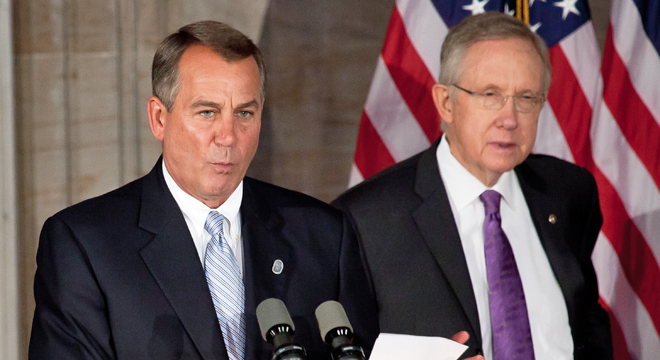At close of business on Tuesday evening, House GOP leadership offices emailed notifications to members and the press, advising that they’d bumped a key vote on legislation to fund the government from Thursday up to early Wednesday afternoon.
They claimed to be motivated by a big, approaching snow storm, which forecasters say will blanket the capital with up to 8 inches of snow.
There’s just one problem. The weather on Thursday is supposed to be clear and warm enough to melt snow. By moving the vote up a day, rather than postponing it or just leaving the schedule untouched, they situated it during the forecasted teeth of the storm.
GOP leaders say they were concerned that roads might still be treacherous on Thursday afternoon. But to Democrats, and even conservative opponents of the continuing resolution up for a vote, the move stank of desperation — a last-ditch attempt to prevent opposition from building within GOP ranks, and hamstring the Democrats’ whip operation.
“It seems to be an effort to rush the process,” said Jacqueline Bodnar, a spokeswoman for the conservative group FreedomWorks, which is warning Republicans not to vote for the bill. “Every hour the votes get bumped up, is one less hour that Members could be crafting and debating amendments to the CR to make it more fiscally responsible. If it was really about the weather, Congress could have postponed the votes to give Members more time.”
A senior Democratic aide shared a similar observation: “I think they’re worried they don’t have the votes, and that they’ll lose if they wait a day.”
We’ll find out if their decision to fast-track the vote pays off a few hours from now. But the last-minute maneuver serves as an awkward reminder that despite premature declarations of detente between the parties, leaders must still navigate a the CR through a landmine-littered legislative terrain and could potentially set off a shutdown inadvertently.
“Right now [House Appropriations Committee Chairman Hal] Rogers has to get his bill through the House, and to see if that bill really does stand,” his Senate counterpart, Barbara Mikulski (D-MD), told reporters in the Capitol on Tuesday. That’s the first step along a bumpy road to funding the government before it shuts down automatically on March 27.
If the House GOP bill fails on Wednesday afternoon, Senate Dems will advance their own spending bill, according to Majority Leader Harry Reid (D-NV).
“I’m anxious to see what the House is going to pass with the CR,” he told reporters Tuesday. “We have a pretty good idea now, but we’ll wait and see what the final product is. We’re going to move on our own legislation to fund the government next week.”
If Republicans do manage to clear their CR, Senate Democrats will at least want to modify it. As written, the House bill reorganizes defense spending to mitigate some of the harm sequestration will cause key GOP priorities. Democrats insist it should provide similar treatment for important domestic initiatives.
“In terms of process we thank the House because it gives us a vehicle to do a CR or a hybrid,” Mikulski said. “But the content is too spartan for us because it does not include domestic priorities.”
But unlike in the House, the Senate’s minority party enjoys filibuster powers and thus has a tremendous amount of say over how extensively legislation can be modified and what legislation will pass. And Republicans have indicated that they won’t let Democrats make drastic changes.
“We’d like to develop an endgame where whatever revisions are added in the Senate also passed the House,” Minority Leader Mitch McConnell (R-KY) told reporters at his weekly Capitol briefing on Tuesday.
His whip, Sen. John Cornyn (R-TX) elaborated — and made clear that they won’t allow the kinds of changes that turn rank-and-file House Republicans against the bill, and once again hand effective control of the lower chamber to Nancy Pelosi.
“I think the problem is if we mess with the CR too much over here, then it’s got to go back to the House and get passed and there’s limitations in terms of what they’ll take,” he told reporters in response to my inquiry. “That’s why I think the sort of modest approach that Senator McConnell was talking about — perhaps some modifications, but not an omnibus — would be the most likely outcome.”
So even if House Republicans avoid a rebellion on Wednesday and send their CR to the Senate, the bill faces an uncertain future. It will need to change enough to satisfy Senate Democrats without protecting so many liberal priorities that House Republicans take a walk. And given the unpredictable nature of the House GOP conference, striking that balance won’t be easy.
But for now at least Mikulski — a headstrong member, and the first female Senate Appropriations Committee chair — is playing the role of constructive negotiating partner.
“President Obama has many wonderful priorities which I support,” she said. “But this bill has to focus on funding levels — funding and keeping the funding of the government…. [T]his is not to deal with all the pent up demand on both sides for policy, riders, language, [but to] look at where money helps drive the economy, jobs, investment, public investment.”






